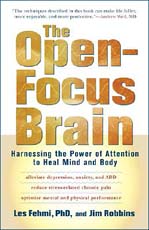"The term 'paying attention' is an apt one, for too often it is more costly than we realize. Failing to deploy our attention appropriately can cost us dearly by contributing to a host of physiological and emotional problems and keeping us from reaching our true potential. The truth is that most of us go through life paying attention the wrong way," writes Les Fehmi, director of the Princeton Biofeedback Center in Princeton, New Jersey. Along with award-winning journalist and science writer Jim Robbins, he contends that most of the time we are stuck in "narrow-objective" focus or attention, defined as a tense and constricted mode of attention that leads to constant stress on the mind and body. It occurs as a reflexive response to fearful situations and leads to emotional numbness due to bottling up of feelings.
The alternative to narrow-focus attention is Open Focus, a broader, more flexible and immersed style of attention. It enables us to move out of the emergency mode of fight-or-flight response and as a result, helps us reduce stress, improve health, and enhance performance. Fehmi and Robbins present attention exercises we can use to train ourselves to use Open Focus attention:
• Expanding Your Awareness of Visual Space
• Head and Hands in Open Focus
• Dissolving Pain
• Heart-Centered Open Focus
• How Am I Now Paying Attention?
• Thinking in Open Focus
• Seeing in Open Focus
Many of these are also on a 60-minute audio CD attached to the back cover of the book. Fehmi and Robbins conclude:
"People going through life with the flexible awareness of Open-Focus — perhaps with daily attention training at work, school, or home — will open their hearts to the fullness of being, and reintegrate forgotten parts of themselves. The brain is built to learn throughout our life span; current research on neural plasticity is proving that. With enough training and practice, learning to flexibly shift attention becomes effortless and natural. Flexible attention permits us to move in and out of full rest, allowing our body to restore itself and thus prevent and heal many stress-based problems common today."
